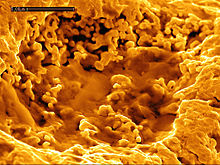Cupriavidus metallidurans strain CH34 (renamed from Ralstonia metallidurans[1] and previously known as Ralstonia eutropha and Alcaligenes eutrophus[2]) is a non-spore-forming, Gram-negative bacterium which is adapted to survive several forms of heavy metal stress.[3][4] [5]Therefore, it is an ideal subject to study heavy metal disturbance of cellular processes. This bacterium shows a unique combination of advantages not present in this form in other bacteria.
- Its genome has been fully sequenced (preliminary, annotated sequence data were obtained from the DOE Joint Genome Institute)
- It is not pathogenic, therefore, models of the cell can also be tested in artificial environments similar to its natural habitats.
- It is related to the plant pathogen Ralstonia solanacearum.[6]
- It is of ecological importance since related bacteria are predominant in mesophilic heavy metal-contaminated environments.[2][7]
- It is of industrial importance and used for heavy metal remediation and sensing.[4]
- It is an aerobic chemolithoautotroph, facultatively able to grow in a mineral salts medium in the presence of H2, O2, and CO2 without an organic carbon source.[8] The energy-providing subsystem of the cell under these conditions is composed only of the hydrogenase, the respiratory chain, and the F1F0-ATPase. This keeps this subsystem simple and clearly separated from the anabolic subsystems that starts with the Calvin cycle for CO2-fixation.
- It is able to degrade xenobiotics even in the presence of high heavy metal concentrations.[9]
- Finally, strain CH34 is adapted to the outlined harsh conditions by a multitude of heavy-metal resistance systems that are encoded by the two indigenous megaplasmids pMOL28 and pMOL30 on the bacterial chromosome(s).[3][4][10]
Also it plays a vital role, together with the species Delftia acidovorans, in the formation of gold nuggets, by precipitating metallic gold from a solution of gold(III) chloride, a compound highly toxic to most other microorganisms.[11][12][13]
| Cupriavidus metallidurans | |
|---|---|
| Scientific classification | |
| Domain: | |
| Phylum: | |
| Class: | |
| Order: | |
| Family: | |
| Genus: | |
| Binomial name | |
| Cupriavidus metallidurans Goris et al. 2001; Van Damme and Coenye 2004 | |
https://en.wikipedia.org/wiki/Cupriavidus_metallidurans
above.

No comments:
Post a Comment